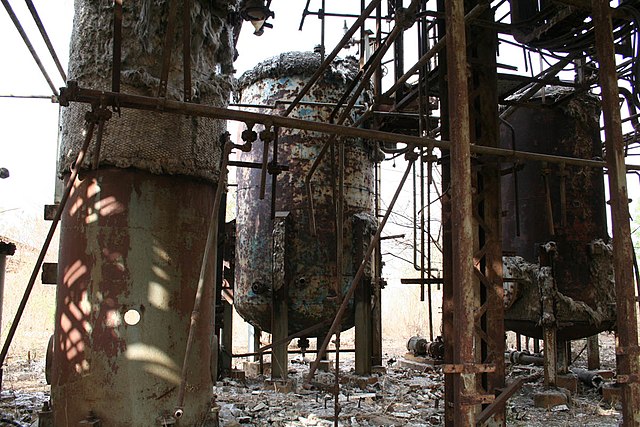September 8, 2021
either/view ⚖️
Remembering lost lives
To: either/view subscribers
Good morning. Are you a foodie on the lookout for a new job? You might be the perfect fit for the role of a ‘Pro-Tato Tester’ in the UK.
All you need to do is taste potatoes and meat at the restaurant ‘The Botanist’ and review if their food is good. You will be called a roast reviewer and work on the weekends. The applications for the role ends by September 12. So hurry up! Oh, did we mention you’ll be paid €500? That’s about ₹43,000. Okay, see you at the contest!

📰 FEATURE STORY
A memorial for the Bhopal gas tragedy victims?

Sometimes we get lost in the depth of our history books. Unconsciously, we conjure up images of what would have happened. But one incident we would definitely not want to revisit is the 1984 Bhopal gas tragedy. We have not yet fully recovered from the tragic leak.
In such times, the Madhya Pradesh government has announced that they will build a memorial for the victims of the chemical leak. While the initiative is generally appreciated by all, the survivors of the tragedy think the government is playing dirty games.
Context
On one of the most unfortunate nights in 1984, India witnessed its first major industrial disaster. The dangerous chemical methyl isocyanate spilled out from a pesticide plant named Union Carbide India Limited. 30 tonnes of the gas reportedly took the lives of 3,787 people and affected more than 5.58 lakh individuals in Bhopal. But these are the official numbers we are looking at. Organisations have claimed that the disaster has killed at least 25,000 people in all.
Two decades later, in 2005, the Madhya Pradesh government floated a national design competition for the memorial. The idea was clear. The memorial should be centered around the 1984 tragedy victims. So yes, the competition was held; a winner was selected and the project was mooted. But the plan saw a break in years. And sometime in 2009, the state government decided that the memorial will be built then. They wanted to turn the defunct factory into an ‘accident heritage site’ for visitors. But the proposal failed. Why? Simply because the activists first wanted the government to clear toxic chemical waste from the vicinity. However, the government denied reports that showed the presence of toxic waste. This clash culminated in the end of the plan.
Talks of the memorial resurfaced in 2016. The state government confirmed that the memorial will be built. This time around, they admitted that hazardous waste was indeed present at the site. So they pulled up their sleeves and got rid of 10 tonnes of the waste. They said the rest of the waste will most likely be incinerated by the Central Pollution Control Board. That was that.
Now years later, the government has again promised to dispose of 337 metric tonnes of toxic waste to construct the memorial. News is that nearly ₹180 crores will be invested in building the memorial. But the delay in plans and improper removal of waste is irking the survivors and activists. They are upset with the government and say the project will be dangerous for everyone.
Why is the memorial being built?
The 1984 disaster took away the lives of thousands of innocent people in Bhopal. For generations, people have been suffering from the aftermath of the incident. So the government finds it important to build a memorial and commemorate those who lost their lives in the gas tragedy.
Apart from the purpose of paying tributes, the memorial will stand as a reminder to the world. Madhya Pradesh CM Shivraj Singh Chouhan says that the memorial will remind us that there should be no recurrence of such a tragedy. It will prompt us to protect our environment from man-made disasters.
Government plans reveal that once the toxic waste is disposed of, the memorial will be built at the site of the old factory. After the memorial is built, it will be called the Bhopal Memorial. The monument will house heartbreaking pictures of the disaster and that of the old factory. Aside from the memorial, the land will be used to build a research and development unit, an open theatre and a community hall.
Practically, the memorial will generate more employment in the abandoned factory premises. The government says the memorial will provide jobs and a good life to the gas tragedy survivors. Even before that, the toxic waste which has been bothering people will be removed from the land. This would be a huge relief to the residents.
Keeping in mind all the benefits of building the memorial, the government issued a tender for the waste disposal. Reports suggest that two companies have won the bid. Very soon, an expert panel will decide who will get the work order. Within four months, the government aims to get the area cleaned up from the toxic waste. Once the chemical waste is discarded, work on the memorial will finally begin. If things go per plan, this project will benefit the residents environmentally and financially.
Strong opposition from critics
Gas tragedy survivors, activists and locals are strongly against this project. It is not the idea of a memorial that haunts them, it is the chosen location for the project. The government has proposed to build the memorial at the highly contaminated site of the factory. For years now, reports have shown that tonnes of toxic waste is still present in the area. The soil and groundwater is contaminated with high concentrations of organic pollutants. What’s more worrying is that these chemicals are known to retain their toxicity for more than a hundred years. So, even if the factory site is cleared and a memorial is built, the land will continue to remain unsafe. Then the memorial will be dangerous for the locals as well as the visitors.
Scientific evidence shows that toxic chemicals are present in high volumes starting 3 kilometers away from the factory. All of these chemicals have been contaminating the groundwater in Bhopal for several years now. So the local organisations propose that the government should first carry forward proper scientific research in the factory area. Only after thorough reports are published, should the government remove the toxic waste.
People are distraught that the government is hastily moving ahead with the memorial construction. Survivors’ organisations question how the memorial would provide them jobs. They point fingers at the Gas Relief Department which did not make use of a ₹100 crores sanction for almost a decade now. They say there is clearly no guarantee for employment of the survivors.
Many people look at the project with suspicion. The government has not granted due pension, rehabilitation and treatment for the gas tragedy survivors. They accuse the government for not focusing on environmental recovery. People are also furious that instead of providing better health facilities, the authorities were planning for a memorial on a toxic land. They say this is the government’s attempt to cover up the incident and get rid of the issue.
People criticize the government for not excavating enough toxic waste from the area. It is estimated that the solar evaporation pond in the area contains over 1.7 lakh tonnes of toxic sludge. Out of this, only 5% of the waste has been removed so far. If the remaining chemical waste is quickly disposed of without scientific research, it could pose severe problems in the future. Additionally, if concrete was poured over the contaminated area to build the memorial, it would force people to live in a toxic environment.
🕵️ BEYOND ECHO CHAMBERS
For the Right:
Why the RSS is wrong to denigrate the Mappila rebellion
For the Left:
A prescription for Kerala: on COVID-19 response
🏴 STATE OF THE STATES
Complaints portal (Jammu and Kashmir) – An online portal has been launched by the government for Kashmiri migrants to register their complaints on distress sales of their properties in the Union Territory. The migrants were forced to leave the Valley due to terrorism. Notably, the portal can be used by any Kashmiri migrant, irrespective of their faith. All complaints registered through the portal will be dealt with in a time-bound manner. The portal can be accessed at https://kashmirmigrantsip.jk.gov.in. This initiative has been welcomed by the migrant community.
Waxed apples (Mizoram) – The government has alerted citizens to the presence of wax-coated apples in the markets. The issue came to notice while checking imported fruits and vegetables at the state border. Synthetic wax is dangerous to the human body, as they create a lining on the walls of the intestines, leading to stomach ailments. The government has advised citizens to eat the apples only after washing in hot water or after peeling off the outer layer.

Shocking superstition (Madhya Pradesh) – In a shocking incident, people in a tribal village in Damoh district made two minor girls to parade naked carrying a heavy wooden flail to please the rain gods. As the region is prone to drought, villagers resorted to such desperate superstitious measures. The girls were accompanied by other women, including their mothers, during the procession. The women sang bhajans, begged for food grains, and prepared food in the fields to complete the ritual. Police noted that this was a tradition here, and they would take action if anyone forced the girls while they were paraded naked.
Model initiative (Telangana) – T-Hub, an initiative by the state government in partnership with private players to incubate startups, has been applauded for its work by the Parliamentary Standing Committee (Information Technology). The committee, which includes Shashi Tharoor, Mahua Moitra, Tejasvi Surya, Karthi P Chidambaram, among others, visited the campus to study their model so that it can be replicated across the country.
Cricket factions (Bihar) – Two factions in the state have each been claiming to represent the Bihar Cricket Association (BCA). One faction is led by former BJP treasurer Rakesh Tiwary, and the other by BJP spokesperson Prem Ranjan Patel. While Tiwary maintains that he is the BCA president, Patel claims that he is the president since Tiwary has been removed from his position after an emergency meeting with district associations. With the Vinoo Mankad Trophy scheduled to be held soon, both the factions are planning to send their own list of under-19 players to the Board of Control for Cricket in India (BCCI). Meanwhile, BCCI has said that it will not tolerate such activities and will inquire into the matter.
🔢 KEY NUMBER
469 – Number of tree species in India that are threatened with extinction, according to the State of the World’s Trees report. It is almost 18% of the 2,603 tree species found in India.

